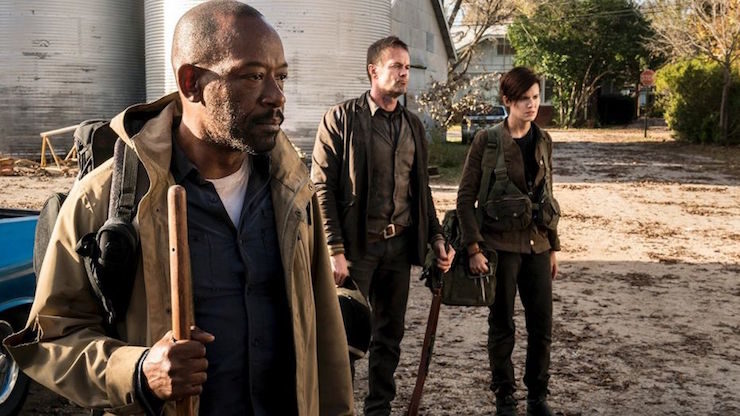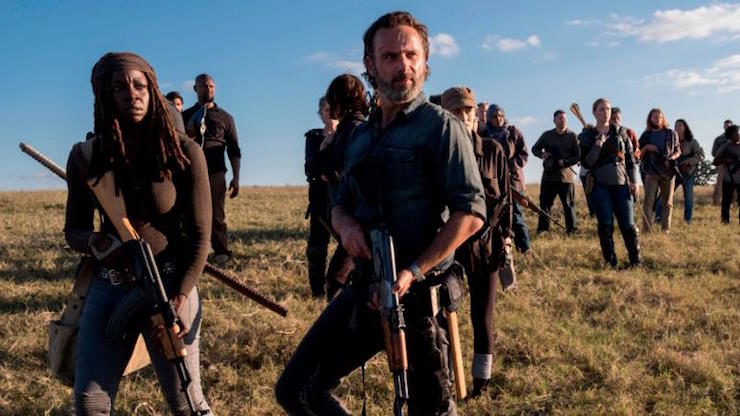The last piece I wrote about the show was called “Is There Still Hope For The Walking Dead?” The temptation to title this one “…Yep.” was almost overwhelming.
It’s becoming almost a tradition to take a long look back at all the things The Walking Dead screws up in every season because, like any long running show, it does screw up an awful lot. The pacing is glacial, and the increasingly vast cast of characters is only well served by the plot and script about a third of the time. The show’s overt fondness for grimdark spectacle and repetition of narrative cycles (it’s Rick’s darkest hour, again!) is now built in irrevocably to every new season. And let’s not forget how many immensely troublesome child characters the show has featured—or the arbitrary, even controversial, removal of one of its longest-serving cast members earlier in the season. Every single one of these faults was front and center through Season 8. Every single one of these faults damaged the show. Most of them have damaged the show before, and I’m pretty certain a lot of them will do so again.
But…as the eighth season closes, The Walking Dead has done three impossible things. At least two of them have worked—and all of them have ensured the show will never be the same again.
The first, and most obvious, of these things is the show’s functional divorce from the timeline of the comics. The death of Carl Grimes means that this is a vastly different world now, and the end of Season 8 suggests that those differences will be key to the show’s future. While a lot of discussion has already been had over the that possibility Maggie, Daryl, and Jesus will be next season’s antagonists, I find that prospect unlikely. Rather, the show is using the ethical consequences of the war, and the cost of Carl’s idealized mercy, to explore the one thing it’s never done before: what happens when this group of survivors fractures along potentially irreparable lines. No one in this situation is wrong. But no one is right enough—and for a series that’s had a long line of plain-speaking villains, that ambiguity is rich and fertile ground to explore. For any show in its eighth season, that would be good news. For one that has, at times, seemed utterly becalmed and weighed down in its tropes, it’s fantastic news. The price of this chance at forward momentum, of course, is the loss of Carl Grimes and Chandler Riggs. As I said in the last piece, for some people in the audience that price will be too high. For those that stay, however, it looks set to lead somewhere truly different and new.
Then there’s the fact that this is a TV show that may be able to have its cake and stab it through the rotting brainpan, too. The Saviour War ends, very loosely, in pretty much the same way it does in the comics. There are already hints of one, perhaps even two, of the larger forces present in the later comics run emerging in the series. So, it’s hitting all the right notes, just not necessarily played in the order we were expecting.
This may smack a bit of P.T. Barnum, sure, but that’s pretty much The Walking Dead’s over-the-top brand. The idea of seeing established events from the comics not so much adapted verbatim but still covered in the show is a potentially very exciting one—especially as the groups that we’ve seen so far seem to indicate a continuation of the series’ strongest central elements: the expansion of its world and the exploration of society’s hard-fought, often brutal reboot.

And that brings us to the truly new stuff: the crossover. Morgan, played by Lennie James, leaves this season. Plagued by visions of the people he’s killed, Morgan decides he needs to be away from humans for a while. That journey takes him to Texas and to Fear The Walking Dead, where he’ll be a regular cast member this season.
That’s revolutionary in two or three different ways. The first is the further expansion of the world I’ve already mentioned. Morgan, when or if he returns, will do so with proof of life in another part of America. Even if he doesn’t, the simple presence of his character on what started out as a prequel show changes the tone of this entire universe. The dead are no longer the end—society is coming back. There is still hope for humanity.
And that hope extends to the audacious effect this crossover move will have on Fear. After fighting its way through two lumpy and often rather bad opening seasons to get to a barnstormer of a third year, Fear The Walking Dead is no longer in prequel territory and is now contemporaneous with the core show. In fact, cutting as it apparently will between flashbacks exploring the time jump and the present day, it’s even set slightly in the future. After all, Morgan is basically walking to the other show; it’s going to take a while.
This opens up some massively fun possibilities. An event in one show could be echoed in the second, extra or different context could be provided, or and we could get differing perspectives on new factions depending on what we’re watching. Best of all, connecting the two series like this in the overall narrative is akin to connecting the settlements: The world has changed. Things are different now. It’s time for different kinds of stories.
The Walking Dead is a show that asks a lot of its viewers and rarely, if ever, has it asked more than it did in Season 8. But for all the ponderous pacing and deeply unsettling narrative choices, the show has arrived at the same place as its characters: somewhere new. Somewhere larger. Somewhere rife with possibility. New showrunner Angela Kang is now presiding over half of a much-changed world. And, much like the perennially challenged, tenacious survivors of the show itself, I wouldn’t bet against her.
Alasdair Stuart is a freelancer writer, RPG writer and podcaster. He owns Escape Artists, who publish the short fiction podcasts Escape Pod, Pseudopod, Podcastle, Cast of Wonders, and the magazine Mothership Zeta. He blogs enthusiastically about pop culture, cooking and exercise at Alasdairstuart.com, and tweets @AlasdairStuart.










